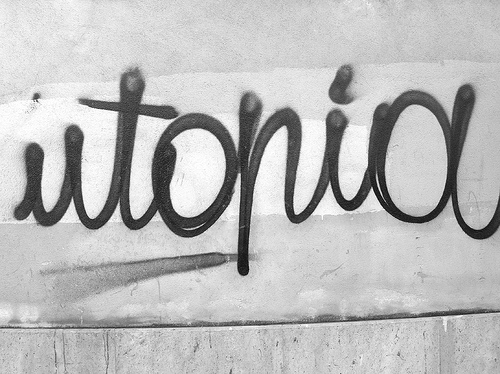|
LITR 5439 |
Literary & Historical Utopias: Model Assignments
Sample Essay |
|
Katie Raney
Critical Thinking in
Ecotopia: An Examination of Utopian Education
One of my primary interests throughout the course this semester has been
examining the education in utopias and dystopias, relating to objective
5b which asks, “What
does utopian / dystopian literature instruct us about education?”
Specifically, I have been interested in looking at the way the different
societies value or repress literacy and critical thinking skills. From our
readings and my research postings, I have found that literacy and critical
thinking skills play a primary role in emerging from a dystopia or a vital role
in having a successful utopian society.
However, Ecotopia is a utopian
novel that seems to break the rules, as literacy does not appear to be leading
factor in this utopian society! Reducing their schools to farms, some Ecotopians
even “miss the basics of reading, writing, and arithmetic, though they tend to
learn them in concrete contexts,” exhibiting how literacy is not as fundamental
to their education system has it has been in other works that I have read
(Callenbach 130). Even so, to branch off of my past ideas, I wanted to take an
in-depth look at the critical thinking skills, rather than literacy, that do
happen inside of Ecotopia, and I am hopeful about finding that their education
may not be so different after all! Though they do not focus on literacy, they do
pour their resources into acquiring knowledge and applying it to their lives.
When Will first arrives in Ecotopia, he cannot help but make underhanded
remarks about how backwards he perceives the Ecotopians.
In describing their transportation system, he remarks that their
“vehicles obviously cannot satisfy the urge for speed and freedom which has been
so well met by the American auto industry and our aggressive highway program”
(Callenback 29). Here, Will uses the word “obviously” as if it is common
knowledge that the Ecotopians are far inferior, and he describes the American
highway program as “aggressive” as if Americans are continually making strides
for improvement, unlike the Ecotopians.
The highway system is not the only part in which Will casts judgments
about the Ecotopians’ seeming inferiority.
This also happens when he discusses the medical system saying that the
Ecotopians “have probably turned medical science back fifty years.”
He even adds that he has “visions of being bled,” an archaic outdated
means of medical treatment (24). Interestingly, this exact treatment is used as
the description of medical treatment in
Anthem, which is noted in my midterm, which does indicate a society where
learning has not progressed. In describing the schools, Will goes on to write
that they are “perhaps the most antiquated aspect of Ecotopian society” (126).
However, as one examines the society further, they see that Ecotopia is a
civilization that may not be as backward as Will first speculates, proving that
they have advanced knowledge and critical thinking skills. Upon first entering
Ecotopia, Will is unable to identify the plants and greenery on the train.
However, his Ecotopian companions are able to “[reel] off their botanical
names with assurance” and ease (8), showing they do have knowledge that Will
himself did not possess. Additionally, it is the “educational campaigns” in
Ecotopia that point out “that synthetic fiber production used far more
electricity and water, and produced far more noxious by-products than natural
fiber production” (94). Also in the society, “intellectual discussion is enjoyed
almost for its own sake, as an art” (144). They may not adhere to our American
standards, but through these examples knowledge and critical thinking are seen
in the society.
Though their education is not focused on literacy, advancements in technology
and innovation prove that their education system is more functional than at
first glance. In one of his articles, Will discusses how a radio is “powered by
a waterwheel,” and he goes on to write that “some clever inventor” engineered it
(114). Here, we see that the
Ecotopians do have the ability to create technological advancements.
They even have a National Science Foundation in which one invention won
them the Nobel Prize (140). Furthermore, “special types of oceanographic
research are highly advanced,” and Will records that they even have a team that
is working to “decode the ‘speech’ of dolphins” (140). Will even directs his
attention back to the medical field later in the novel and writes that “mental
illness has shown a decline since Independence,” and “the Ecotopian streets are
not enlivened by the numerous and obvious crazies [Americans] are familiar with
in [their] cities,” showing a breakthrough in this society that Americans have
not been able to conquer (156). Also, in describing the university level of
education, Will insists that universities have “facilitated the adoption of so
many startling innovations so quickly,” and they engage in “intellectual rigor”
(143-144). Even in the helicopter
crisis, the Ecotopians are able to shoot down the helicopters “as fast as they
[come] in” proving their military prowess (125).
Not only are they able to shoot down thousands of American planes, the
allegedly educated American public is completely unaware of this; yet, it is
common knowledge in Ecotopia. These
facts do not seem to point to a stagnant, ignorant society.
Rather, they point to a society that promotes learning and thinking.
In some respects, the Ecotopian school system also proves utopian as it seems to
parallel the education in Herland. In
Herland, Van remarks that “[the
women] had worked out a chemistry, a botany, a physics, with all the blends
where a science touches an art, or merges into an industry, to such fullness of
knowledge as made us feel like schoolchildren” (Perkins Gilman 64).
This statement seems familiar to the education described in
Ecotopia when Will comments that
“they seem to have an astonishing scientific sophistication” (Callenbach 127).
He then goes on to describe how a six-year-old is able to look at a
“creepy-looking bug” and remark, “Oh yes, that’s the larval stage” (Callenbach
127). Scientific knowledge such as
this seems to be something that both societies embrace.
In Herland and
Ecotopia, the societies also seem to
have the idea that education is not something that should be stringently forced
with rules. In
Ecotopia, while doing an interview,
Will details a teacher’s response that says American schools have a “prison
atmosphere,” but the schools in Ecotopia enable children and nature to “grow”
(Callenbach 126). Similarly, in Herland,
“the babies and little children never
felt the pressure of that ‘forcible feeding of the mind that we call
‘education’” (Perkins Gilman 95). Both of these examples show the freedom that
the children have in these environments to learn. Also, both societies seem to
emphasize the idea that learning does not have to take place in a classroom.
In Herland, “the children are
taught throughout life” which is seen as we read that “before them stretched the
years of learning and discovery, the fascinating, endless process of education”
(Perkins Gilman 104). In fact, Van
reinforces this idea when he writes that the women of Herland gave “all
education but no schooling” (Perking Gilman 106). This is analogous with the
education system in Ecotopia that is also a “part of everyday life” that takes
place at school or in any environment (Callenbach 126). In both societies, the
children are away from the strict rules of the classroom, and these ideas seem
to work for the societies, as they produce citizens that seem productive and
engage in critical thinking skills.
This is quite a contrast to some of the dystopian societies that I have studied
throughout the semester that showed not only a lack of literacy but also a lack
of critical thinking skills, which I think is the biggest thing that I have
reconsidered through the last portion of the semester. While conducting research
for my first research posting, I came across a motto of the Nazi party that
said, “We think with
our blood,” illustrating how they had placed the emphasis on becoming killing
machines rather than intellectual, critical thinkers (Grunberger 298).
Also, as I discussed in my midterm, there was an astounding repression of
critical thinking skills in dystopian literature. For example, we see this when
Equality goes before the Council, introduces his technology, and is refuted by
them when they remark that “all men must” “[abandon] their ideas” (Rand 73).
These dystopias show a clear repression of critical thinking, not just literacy.
Though there is a lack of literacy in
Ecotopia, the citizens seem to be encouraged to think and invent for
society, unlike the dystopias previously mentioned.
One thing that Ecotopia helped me to
discover is that utopian education does not always place an emphasis on
literacy. However, utopias are
always coupled with critical thinking.
The ability to think for one’s self, contribute to society, and be a
productive, active learner is something that is required for a utopian vision
which is evidenced in Ecotopia and
Herland.
Though I have previously been able to connect it to literacy directly, I
realize that it may not need the direct relation with literacy.
The most essential component to utopian education is critical thinking.


